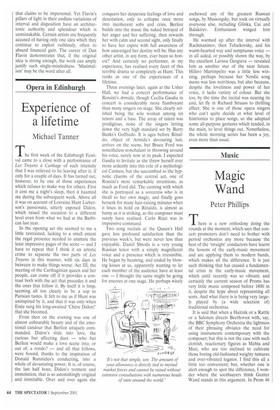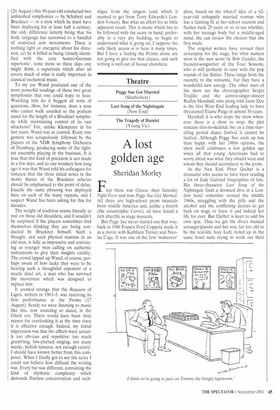Magic Wand
Peter Phillips
There is a new orthodoxy doing the rounds at the moment, which says that concert promoters don't need to bother with period orchestras any more because the best of the 'straight' conductors have learnt the lessons of the early-music movement and are applying them to modern bands, which makes all the difference. It is just such thinking that has caused a fundamental crisis in the early-music movement, which until recently was so vibrant; and certainly the current season of Proms has very little music composed before 1800 in it, despite the hype about representing all sorts. And what there is is being very largely played by (a wide selection of) traditional orchestras.
It is said that when a Haitink or a Rattle or a Salonen directs Beethoven with, say, the BBC Symphony Orchestra the lightness of their phrasing obviates the need for using instruments contemporary with the composer; but this is not the case with such clottish, reactionary figures as Mehta and Muti, who are too inclined to cultivate those boring old-fashioned weighty textures and over-vibrated legatos. I find this all a little too convenient; but, whether one is alert enough to spot the difference, I wonder where the soothsayers think Gunter Wand stands in this argument. In Prom 46 (24 August) this 90-year-old conducted two unfinished symphonies — by Schubert and Bruckner — in a style which he must have been deploying for at least half a century, the only difference latterly being that his body language has narrowed to a handful of restricted arm movements. There is nothing light or energetic about his direction. yet he is billed as being 'closely identified with the core Austro-German repertoire', none more so these days one might think, a repertoire which after all covers much of what is really important in classical orchestral music.
To my ear Wand produced one of the most powerful readings of these two great symphonies that one could hope to hear. Watching him do it begged all sorts of questions. How, for instance, does a man who cannot walk unaided to the podium stand for the length of a Bruckner symphony while maintaining control of its vast structures? For, unlike Klemperer in his last years, Wand was in control. Every tiny gesture was scrupulously followed by the players of the NDR Symphony Orchestra of Hamburg, producing some of the tightest ensemble playing in the business. It is true that this kind of precision is not made in a few days, and so one wonders how long ago it was that Wand told his colleagues for instance that the three initial notes in the motto theme of the Bruckner scherzo should be emphasised to the point of delay. Exactly the same phrasing was deployed here on each of the many repeats, and I suspect Wand has been asking for this for decades.
The weight of tradition seems literally to rest on those old shoulders, and I wouldn't be surprised if the players sometimes find themselves thinking they are being conducted by Bruckner himself. Such a thought, and such physical stamina in an old man, is fully as impressive and convincing as younger men calling on authentic instruments to give their insights validity. The crowd lapped up Wand, of course, perhaps aware of how lucky they were to be hearing such a thoughtful exponent of a nearly dead art, a man who has survived the movement which was designed to replace him.
It seemed strange that the Requiem of Ligeti, written in 1963-5, was receiving its first performance at the Proms (17 August). Surely we were listening to music like this, now sounding so dated, in the Glock era. There would have been little reason for overlooking it at the time since it is effective enough. Indeed, my initial impression was that the effects were actually too obvious and repetitive: too much grumbling, low-pitched singing, too many murky, hellish textures, not enough variety. I should have known better from this composer. When I finally got to see the score I could not believe how difficult the writing was. Every bar was different, containing the kind of rhythmic complexity which demands flawless concentration and tech
nique from the singers (and which it seemed to get from Terry Edwards's London Voices), But what an effort for so little apparent result. This is music which has to be followed with the score in hand, preferably in a very dry building, to begin to understand what is going on. I suppose the only likely access is to hear it many times. But I have a feeling the Proms alone are not going to give me that chance, and such writing is well out of favour elsewhere.



























































 Previous page
Previous page